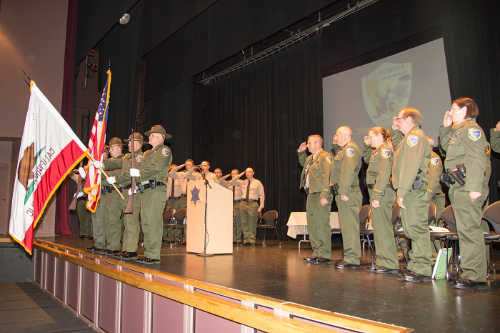- Editor
- Posted On
Middletown Art Center hosts opening of 'Community Works' Aug. 27

MIDDLETOWN, Calif. – “Community Works,” an exhibition of art work inspired by the Valley fire and other wildfire experiences of 2015 and 2016, opens at the Middletown Art Center on Saturday, Aug. 27.
The opening will take place from 6 to 8 p.m.
The exhibit, which runs through Sept. 9, includes work by children and adults who used art as a means to give voice and expression to their experience, and as a way to find and make beauty despite chaos and devastation.
Musical guests will be Hearts and Bones. Big Valley and Beaver Creek wines will be available for purchase by the glass.
All proceeds will benefit MAC’s growing palette of programs and scholarship fund. MAC is a project of EcoArts of Lake County, a nonprofit 501c3.
The art center relies on tax-deductible donations, which are, and memberships to supplement income from classes and art sales.
Since the Valley fire, MAC has provided a strong sense of continuity, community and enrichment to recovering residents and the area.
MAC has become an increasingly critical component of life in the south Lake County area as residents continue to restore their lives and rebuild their homes.
The loss of friends and neighbors who have relocated elsewhere within Lake County or left the area entirely still pulsates painfully. Harbin Hot Springs too is sorely missed as both a place of work and a destination for visitors, providing a huge contribution to our local economy.
MAC recently offered two weeks of free healing art classes called “Community Works” to help ease and soothe anxiety and PTSD as the community approaches the Valley fire anniversary in high fire season. In the midst of classes the Clayton fire broke out. Several participants left suddenly to prepare for evacuation.
“A colleague was talking yesterday about how trauma shrinks the back part of our brain and it takes days/weeks to regroup back to ‘normal’,” said artist and teacher Sage Abella, one of several Clayton fire evacuees who sought MAC out as a place of refuge and solace daily. “I think that making art actually wiggles and enlivens that trauma shrink process. I bet making art helps our brain breathe in and out, expanding. At least that's what I feel while making my art inside this emotional time.”
Community Works is a collaboration of Middletown Art Center, local artists, musicians and dancers, and Tri Uplifting Lake County. It is made possible in part by Roby and Associates, a public insurance adjuster and by Lake County Rising Valley Fire Relief Fund.
For more information about Community Works and the schedule of classes offered, visit www.MiddletownArtCenter.org , or find them on Facebook.
MAC is located at 21456 Highway 175, at the junction of Highway 29 in Middletown.


 How to resolve AdBlock issue?
How to resolve AdBlock issue? 








